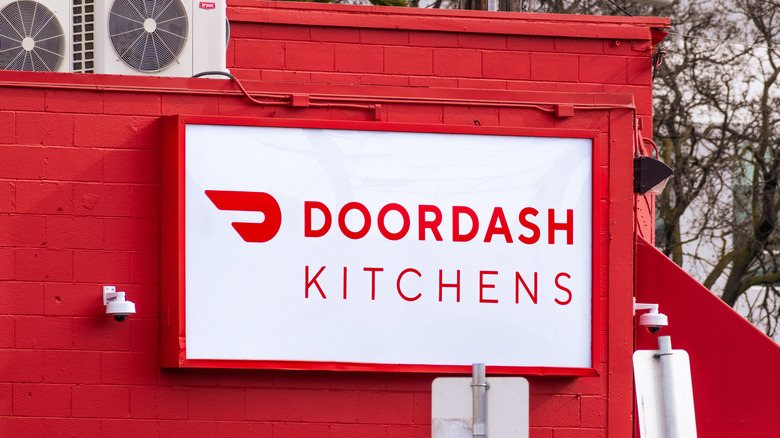Ghost Kitchens Have Nothing To Do With The Undead
From speakeasies to popups, supper clubs, and roadhouses, clandestine dining is nothing new. Their elusive natures still entice adventurous and timid diners to spread their culinary wings. But does that eating-on-the-edge mentality stretch far enough to encompass the afterlife? Here are a few macabre-sounding industry terms that would lead you to think so: ghost kitchens, dark kitchens, and cloud kitchens. Truth be told, they're all just different names for the same concept, and it has no connection to the dead or undead.
Ghost kitchens, while it's evocative of these old-timey dining institutions, have only recently come into being. Ghost kitchens, unlike speakeasies, have nothing to do with gathering in communal spaces and rarely involve alcohol. The spooky-sounding name comes from the fact that (for customers) the business exists only in an incorporeal or virtual space. For those that work in a ghost kitchen, however, it exists in a very real, physical one.
Not so spooky
CloudKitchens, founded by Uber pioneer Travis Kalanick, pulls back the veil to explain that a ghost or dark kitchen is a new business concept with plenty of delicious food and little physical presence to customers. It's a commercial kitchen with no storefront, seating areas, or pickup counters. You wouldn't even know it was operating unless you got a whiff of something yummy floating from an alley or nondescript building.
Ghost kitchens are meeting an expanding need for food deliveries without opening up a physical restaurant that's open to the public, explains CNBC. The rise of these businesses has taken off, particularly during the dining upheavals of the COVID pandemic. It's a delivery-only dining concept, which frees the business from needing a high traffic location, or dining spaces. Brands can be established entirely virtually, with human staff preparing the meals from "hidden" commercial kitchens.
A crucial element in each business' success is its ability to cooperate with delivery platforms like Doordash, Postmates, Grubhub, and Uber Eats, explains CloudKitchen. They all work in tandem to facilitate a virtual restaurant brand with real, physical food being delivered to folks' homes, offices, baseball games, or wherever they choose. Euromonitor expects ghost kitchens to be worth a trillion dollars in the global market by 2030 (via CNBC).
The concept is accessible to entrepreneurs at any level, from foodie daydreamers to multi-level food conglomerates investing in expanded versions of the new industry.
Franchises and existing restaurant spaces
While CloudKitchens explains how budding chefs can get on the lucrative chuckwagon, other ghost-kitchen enterprises are offering franchising opportunities where multiple brands can create diverse meal options under a single roof. Kitchen United operates in seven states as of 2022, providing kitchen centers for a group of virtual restaurants in each location. These businesses work as separate legal entities sharing collective spaces for meal preparation and delivery pickups, which gives consumers the ability to easily choose items from several menus in a single order.
Franchising already exists for ghost kitchens, including The Local Culinary, which calls itself the first ghost kitchen franchise model in the U.S. It expands the concept to offer 50 delivery-only franchises that existing kitchens can partner with — expanding the potential for both franchisers and franchisees. The new plug-and-play food delivery system can be up and running in two weeks for those with an already established kitchen, according to the company, without the need to invest in more space, extra staff, or other expansion costs.
Whether you call them smart kitchens, virtual cafes, dark or cloud kitchens, or ghost kitchens, they're likely in it for the long haul. We say, the more, the merrier when it comes to cultural culinary exploration and broader access to interesting foods.


